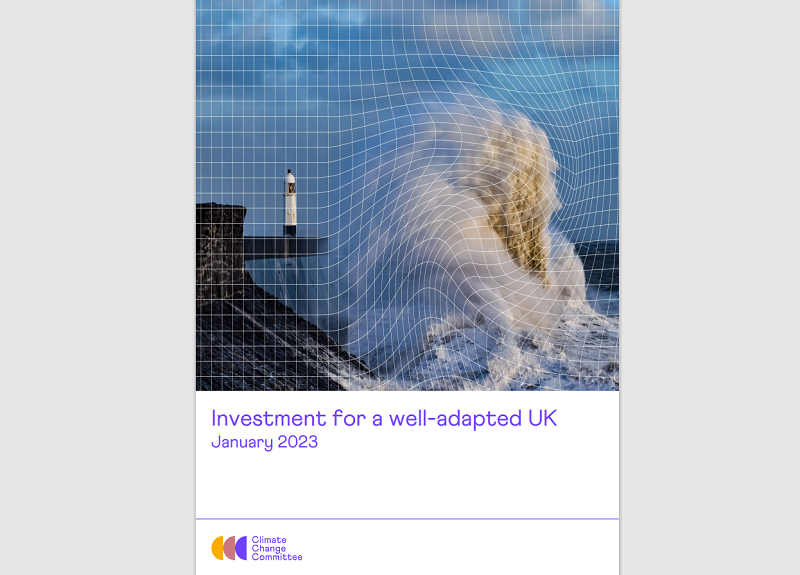As last year’s heatwave demonstrated, the UK already faces significant challenges from the changing climate; these will intensify as warming continues. Government has been too slow to react.
In common with Net Zero, a major programme of investment is required to meet the UK’s adaptation needs. But unlike Net Zero, the Government has not defined its priorities. That uncertainty is preventing progress on appraising the country’s investment needs and closing the adaptation gap.
In this report, the Climate Change Committee (CCC) offers new analysis of the UK’s adaptation investment priorities – and a series of recommendations to ensure that these are funded or privately financed.
The country’s adaptation investment needs already include preparation for flooding, future proofing of infrastructure and housing, investment in public water supply and nature restoration. In these areas alone, it’s plausible that new investment of the order of £10bn per year will be needed to prepare the UK for expected climate change. That figure could rise further with more dangerous levels of global warming.

Baroness Brown, Chair of the Adaptation Committee at the CCC said: “Our last major assessment of the UK’s climate risk found that climate impacts have increased in the UK but that actions to prepare us are not keeping pace. It is no secret that the UK is now experiencing a range of damaging consequences of climate change, but adaptation in the UK remains chronically underfunded and overlooked. This must change.”
Ben Caldecott, Member of the Adaptation Committee at the CCC said: “The UK faces growing climate impacts and needs to rapidly increase public and private investment in climate resilience. These investments will reduce future economic damage caused by floods and heatwaves, and can enhance growth and improve the sustainability of the public finances over time.
“Government funding and public financial institutions have a critical role to play in unlocking private investment but we also need others to play their part. Regulated industries, like the railways and water sector, need to have updated mandates so they can increase investment in climate defences. Financial regulators and government policy must push companies and financial institutions to do much more, including through mandatory adaptation planning and enhanced supervision.
“Integrating climate risk into economic and financial decision-making across society is essential for urgently needed investments in our national climate resilience to materialise.”
It has identified several areas for targeted action by Government:
- Clarifying adaptation goals and roles for investment: The next National Adaptation Programme (NAP3), due in summer 2023, is an opportunity to set out the vision for what adaptation in the UK should achieve and a framework of associated goal and metrics.
- Creating resilience mandates for regulators: The need for investment in adapting to climate change should be included within mandates/strategic priorities for all relevant regulated industry regulators (e.g. energy, water) and implementing agencies (e.g. Environment Agency) through resilience standards aligned to national-level objectives.
- Helping to unlock investment through public financial institutions: UK Public financial institutions (such as the UK Infrastructure Bank, British Business Bank, UK Export Finance, and British International Investment) – should create adaptation finance strategies, setting out they will independently and collectively ensure that no viable UK climate adaptation project fails for lack of finance or insurance.
Public spending must support those investments where the societal value is not easily monetised, such as flood defences to protect towns and cities. Government also has role to ensure wider public investments in roads, schools and hospitals are funded to be adapted for the future climate.
In other areas, private investment in adaptation is more appropriate, but government must act to lower the barriers that prevent it. A reduction in climate risk can be hard to quantify, and the attraction of the investment is much lower without the ability to pay off borrowing. Policy can help to associate cashflows with adaptation benefits:
- Homeowners – Homes can benefit from investing in adaptation. It can lead to reduced vulnerability to flooding or overheating and create a more comfortable home. Incentives to act and a greater awareness of what should be done to prepare for climate risk and reduce emissions is urgently needed.
- Regulated infrastructure – Regulators can require investment in long-term climate resilience from the private or public operators of the system. How this investment can be recaptured must consider fairness and affordability at the same time.
- Private enterprise – Private businesses will be responsible for investing in the resilience of their specific commercial sites and their supply chains. This investment will be cheaper now due to avoiding the exposure to future climate impacts.
Hannah Giddings, Senior Advisor for Resilience & Nature at UKGBC said: “This report makes it clear that adapting the UK to our dangerously changing climate requires a major step-change in leadership and investment.
“As well as accelerating our net zero transition, adapting our built environment for climate change offers massive economic opportunities, including reduced household bills, billions of savings in healthcare and infrastructure repairs, and a potential boom of more than 500,000 skilled local jobs in the coming decade.
“We welcome the Climate Change Committee’s recommendations and hope to see them embedded into the third National Adaptation Programme, so that the Government can support our members across the built environment sector to skill-up, scale-up, and deliver a climate-resilient future.”




















